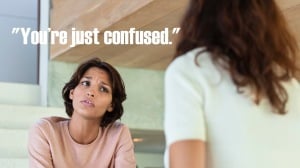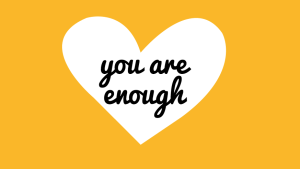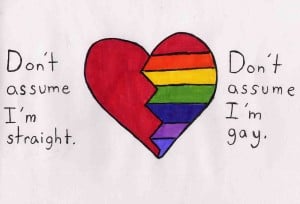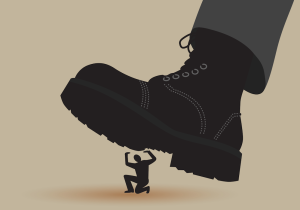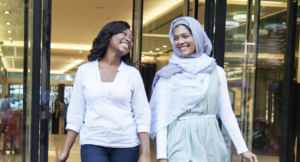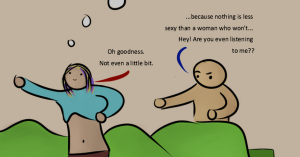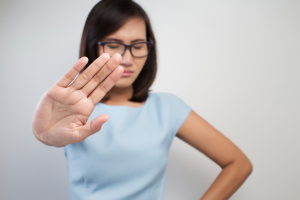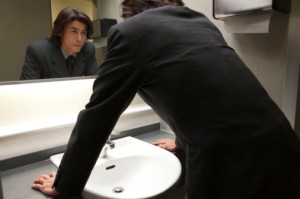
A person wearing a business suit and leaning forward, looking a bathroom mirror. Source: Getty Images
The male gaze is something that society, even beyond feminist circles, is finally beginning to acknowledge.
It’s a term that a lot of people have at least heard by now, and some people have even learned to mock and subvert it.
The male gaze, which refers to the lens through which mostly white, heterosexual men are viewing the world, is a lens of entitlement.
It’s entitlement to all of the privileges awarded to gazers, entitlement to view women (and even to touch them!), and to discuss and exploit their bodies without consequence. And although, surely, not all young men are potential rapists, this kind of entitlement absolutely contributes to rape culture.
Actions like walking up behind a stranger, grabbing her hips, and grinding up against her or staring at her suggestively from across the club while you run your hand down between your legs are examples of entitlement.
Thinking that if you buy a woman a drink, she owes you something, that if you spend all night talking to her, she has to sleep with you are examples of entitlement.
Entitlement is about disregarding a woman’s sexuality, availability, values, and the plain and simple fact that after spending a significant chunk of time with you, she just might discover that you are not at all interesting or attractive.
But feeling entitled to someone’s body isn’t always physical.
It can be as simple as when a woman asks a male co-worker not to leer at her, wink, or whistle when she walks by only to be told, “I didn’t do anything! You’re being crazy!”
And for a minute, or maybe a lifetime, she believes it.
Entitlement even extends to the fact that if you’re not a straight, white man, media consumption can be an incredibly alienating experience because you just get the (accurate) feeling that it’s not made for you.
That is what the male gaze is all about.
Real Life Consequences of the Male Gaze
1. I don’t dance in public.
Dancing is great and fun, but that saying “dance like no one is watching” is a bit hypocritical in a culture where we are told that there are always people watching.
That they have a right to be watching – and judging.
And not just men employ the male gaze.
Other women also objectify and evaluate one another, seeing each other through the gaze because we’re trained to.
It’s not socially acceptable to question the status quo. And that’s where internalized misogyny comes from.
2. No matter what a woman wears, it is assumed that those clothes are worn for the gazers.
Not only does this take away from a woman’s right to bodily autonomy – that she can wear what she wants, when she wants, for no one but herself – but she also will be evaluated at first glance: easy, snooty, bitch. Based on her clothes.
Even the strongest-willed, most open-minded and independent feminists will be made to feel like a medium-rare T-bone once in a while.
And believe it or not, that kind of experience is damaging.
And that kind of damage lasts.
3. It alienates any man who isn’t white and heterosexual, as well as any man who truly and deeply respects women.
And through this alienation, it sustains harmful stereotypes that men are mindless, sex-crazed beasts.
And that resilient stereotype degrades men intellectually, emotionally, and physically.
It ignores all of their uniqueness, their talents, and their entire personalities by reducing them to animalistic brutes.
Because a culture that degrades women can’t flourish if it doesn’t also degrade men who respect women.
This is what we mean when we say that patriarchy hurts everyone – because it maintains a culture where only one type of masculinity is considered acceptable.
4. It invalidates any female sexuality that is not categorized as heterosexual.
In fact, it invalidates any female sexuality, period, while enhancing issues like slut-shaming and fat-shaming.
These types of shame can completely eliminate the ability to explore sexuality or even discuss it in a healthy manner.
In the same way that male stereotypes degrade them into a blank, obnoxious slate, stereotypes of femininity crumble intelligence, free thought, creativity, and self-expression into self-hatred and hatred of other women.
For women who don’t conform to archaic, puritanical standards of sexuality, that type of dominance can destroy self-worth, diminish the ability to speak your mind, and make physical intimacy an anxiety-ridden pass-or-fail final exam.
The reason that the male gaze can specifically trigger all that business is because it isn’t just the event of a man looking at a woman.
It isn’t even just the event of men looking at women as objects.
It is the persistent perception that all men are always objectifying women – and that they should be.
Real Life Alternatives to the Male Gaze
1. Awareness
Train yourself to see the gaze everywhere. Because that’s exactly where it is.
Television shows, commercials, movies, conversations with men, conversations with women, your trip to the grocery store for emergency milk in yoga pants. Find the male gaze, whether literal or figurative.
One of the most useful ways to get used to identifying the male gaze in your daily life is to begin identifying it in the media.
It allows the distance necessary for you to be objective and to think about what we consider normal and what those standards translate into for your everyday life.
Television and movies (and even magazine covers!) are the best source for this kind of analysis.
So many of my favorite shows are also some of the greatest offenders of female autonomy.
A great example is this persistent image of extremely thin, always made-up women falling for slobbish, overweight men because apparently women can – nay, are supposed to – overlook the physical attributes for inner beauty.
And yet, I have never seen a show that demonstrates the reverse.
And it’s this media-perpetuated idea that women are always interested, always available that informs my personal experience of men rarely approaching me with inquiry into my sexual availability and leaving upon my immediate dismissal.
But the male gaze isn’t always so obvious.
Sometimes it’s not physical at all.
Sometimes it’s the fact that men assume I think Channing Tatum is hot, or that I love chocolate, but obsess over the scale daily.
It’s the assumption that I do yoga to impress men with my flexibility, that I stretch out before and after playing sports to “show-off, ” that I follow fashion trends and celebrity gossip religiously.
And these stereotypes are just as damaging.
So notice them. And challenge them.
2. Be Vocal
Talk about it.
Aloud.
If the movie you’re watching is a “chick flick,” does that mean it’s for “chicks” or for objectifying them? If it’s really made and produced for female consumption, why do you sometimes feel alienated or judged by it?
When you start to say these things aloud, several things happen.
Often, other people are feeling the same way, but just don’t know how to address it.
Your speaking out can help because cultural messages like stereotypes get their power from alienation.
Sometimes giving a voice and solidarity to someone who feels like their whole world was made for someone else can give that beautiful, kindred, but potentially frightened spirit the courage to keep thinking for themselves and challenging cultural ideals.
When you speak out, you give others the courage to speak out. Your conversation can be the spark that ignites other conversations.
And don’t be discouraged when maybe maybe someone doesn’t feel the same way, and once you bring it up, they say that you can’t change culture.
Because that’s ridiculous.
Because we still can’t vote or hold our own land, right?
Culture is not the same as it was hundreds of years ago – or even fifty years ago.
We got the right to vote because hundreds of women marched and protested, were arrested, starved themselves, were violently force-fed in U.S. prisons, and eventually earned us the right to vote.
Culture changes all the time.
All it takes is for somebody somewhere to say something.
And the rest, as they say, is history.
3. Be Active
The male gaze isn’t just affecting the way that models and actresses are viewed. It affects every single person that identifies as a woman in real life. Everyday.
Actively thwarting male gaze means that when your self-declarations not to be touched or ogled are dismissed, you can assert the validity of your experience, your voice, and your viewpoint. Sometimes that means going to a boss, professor, or even law enforcement.
I’ve even confronted male co-workers and bosses on behalf of other women, stating that I think it’s wrong, so as not to make them any more uncomfortable.
Don’t just stand there.
Do something.
And if at first, you feel like your actions aren’t working, keep trying until you’re satisfied.
4. Turn the Magnifying Glass into a Mirror
I’m not saying that you need to whistle at guys or comment on their behinds. In fact, I don’t recommend that. That’s still objectification, and if we’re all objects at the end of the day, nothing will ever get done.
However, explain it in whatever terms the gazer will respond to.
Since many heterosexual men tend to say that they’d love for girls to whistle at them, maybe ask them how they would feel if a man treated them that way, or how they feel to know that men catcall their mothers, sisters, girlfriends.
Ask how it would feel to know that whatever you wear or do or say, at any moment, an entire lifetime of success can be reduced to an air-humping motion.
Or to feel around every dark corner that you are about to be sexually violated, humiliated.
Talk openly and honestly about what being a woman feels like in regards to the existence of the male gaze.
Find solidarity in other women’s experiences.
Create change in the viewpoints and experiences of men.
***
The male gaze has been a part of feminist discourse over forty years and yet models today wear the same suggestive, compliant facial expressions as a hundred fifty years ago.
The male gaze isn’t an outdated myth or an indictment of individual men.
It’s an atmosphere that molds self-perceptions, perceptions of other people, and perceptions of what normal interactions should look like.
And challenging it is an integral part of feminism.
[do_widget id=’text-101′]
Kelsey Lueptow is a small town amateur yogi, poet, and feminist from Wisconsin. She’s a single mother and seasonal waitress working on a Bachelor’s degree in Creative Writing and Women’s Studies. Caffeine addict and book enthusiast, Kelsey spends her time playing with her son and hanging out at coffee shops.
Search our 3000+ articles!
Read our articles about:
Our online racial justice training
Used by hundreds of universities, non-profits, and businesses.
Click to learn more





